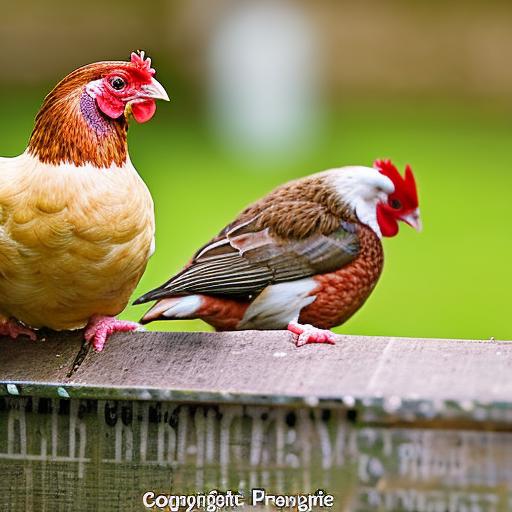Keeping chickens on a housing estate is becoming increasingly popular as more people seek to embrace sustainable and self-sufficient lifestyles. The benefits of having fresh eggs, natural pest control, and fertilizer for gardens are enticing for many homeowners. However, before embarking on this endeavor, it is crucial to understand the regulations and rules that govern keeping chickens on a housing estate. Failure to comply with these regulations can result in fines or legal issues. In this article, we will explore the importance of understanding housing estate regulations, the rules and regulations on keeping chickens, the advantages and disadvantages of keeping chickens on a housing estate, choosing the right chicken coop, tips for building and maintaining a chicken coop, and considerations for noise and smell.
Key Takeaways
- Housing estate regulations may have rules and regulations on keeping chickens.
- Keeping chickens on a housing estate has advantages such as fresh eggs and natural pest control.
- Disadvantages of keeping chickens on a housing estate include noise and smell concerns.
- Choosing the right chicken coop and proper maintenance are important for keeping chickens on a housing estate.
- Consider noise and smell factors before deciding if keeping chickens on a housing estate is right for you.
Understanding Housing Estate Regulations
Before bringing chickens onto a housing estate, it is essential to check with the local council or housing association to understand the regulations that govern this activity. Each housing estate may have its own set of rules regarding the number of chickens allowed, coop placement, and noise restrictions. Some housing estates may not allow chickens at all, while others may have specific guidelines that need to be followed. It is important to familiarize yourself with these regulations to ensure compliance and avoid any potential fines or legal issues.
Rules and Regulations on Keeping Chickens
The rules and regulations on keeping chickens on a housing estate can vary depending on the location. Some common regulations include restrictions on the number of chickens allowed per household, coop placement requirements, and noise restrictions. For example, some housing estates may only allow a maximum of four chickens per household to prevent overcrowding. Coop placement may also be regulated to ensure that it does not cause any inconvenience or disturbance to neighbors. Noise restrictions may be in place to prevent excessive noise from disturbing other residents.
It is crucial to follow these rules and regulations to maintain harmony within the housing estate. Failure to comply can result in fines or legal action. By understanding and adhering to these regulations, homeowners can enjoy the benefits of keeping chickens while respecting the rights and comfort of their neighbors.
Advantages of Keeping Chickens on a Housing Estate
Keeping chickens on a housing estate offers numerous advantages. One of the most significant benefits is having a constant supply of fresh eggs. Homeowners can enjoy the taste and nutritional benefits of eggs that are produced right in their backyard. Additionally, chickens provide natural pest control by eating insects and other pests that may be present in the garden. This can help reduce the need for chemical pesticides.
Chickens also produce high-quality fertilizer for gardens. Their droppings are rich in nutrients that can be used to nourish plants and improve soil quality. This natural fertilizer is an eco-friendly alternative to synthetic fertilizers.
Even on a small housing estate, these benefits can still be enjoyed. With proper coop placement and management, homeowners can successfully keep chickens and reap the rewards of fresh eggs, natural pest control, and fertilizer for their gardens.
Disadvantages of Keeping Chickens on a Housing Estate
While there are many advantages to keeping chickens on a housing estate, there are also potential downsides that need to be considered. One of the main concerns is noise. Roosters, in particular, can be quite loud and may disturb neighbors, especially in close proximity living situations. It is important to check the regulations regarding noise restrictions and consider whether it is feasible to keep chickens without causing excessive noise disturbances.
Another potential issue is the smell associated with chicken coops. Chicken manure has a distinct odor that can be unpleasant if not properly managed. It is important to regularly clean the coop and use odor-neutralizing products to minimize any potential smell issues.
Lastly, keeping chickens may attract predators such as foxes or rats. It is crucial to ensure that the chicken coop is secure and predator-proof to protect the chickens from harm.
To mitigate these potential downsides, homeowners can take steps such as choosing a breed of chicken that is known for being quieter, regularly cleaning the coop to minimize smell, and implementing predator-proof measures to ensure the safety of the chickens.
Choosing the Right Chicken Coop for Your Housing Estate

Choosing a suitable chicken coop is essential when keeping chickens on a housing estate. The coop should be designed to provide a safe and comfortable environment for the chickens while also adhering to any regulations regarding coop placement.
When selecting a chicken coop, it is important to consider factors such as size, materials, and design. The size of the coop should be appropriate for the number of chickens being kept. It should provide enough space for the chickens to move around comfortably and engage in natural behaviors such as scratching and perching.
The materials used in the construction of the coop should be durable and weather-resistant. Wood is a common choice for chicken coops due to its insulating properties and natural appearance. However, it is important to ensure that the wood is treated or naturally resistant to rot and pests.
The design of the coop should also be considered. It should have proper ventilation to ensure good air circulation and prevent moisture buildup. The coop should also have easy access for cleaning and egg collection.
Tips for Building a Chicken Coop on a Housing Estate
Building a chicken coop on a housing estate requires careful consideration of the location and materials used. It is important to choose a discreet location that minimizes any potential visual impact on neighbors. Placing the coop in an area that is not easily visible from neighboring properties can help maintain harmony within the housing estate.
When constructing the coop, it is important to use appropriate materials that are safe for chickens and comply with any regulations regarding coop construction. The materials should be sturdy and predator-proof to ensure the safety of the chickens.
Additionally, it is crucial to ensure that the coop is secure and predator-proof. This includes using strong wire mesh to cover windows and vents, burying wire mesh around the perimeter of the coop to prevent digging predators, and ensuring that the coop has a secure locking mechanism.
Maintenance and Cleaning of Chicken Coop on a Housing Estate
Regular maintenance and cleaning of the chicken coop are essential to ensure the health and well-being of the chickens. A clean and hygienic coop helps prevent the spread of diseases and parasites.
Cleaning the coop involves removing any soiled bedding, droppings, and uneaten food. It is important to wear gloves and a mask when cleaning to protect against any potential pathogens. The coop should be thoroughly cleaned and disinfected on a regular basis.
In addition to regular cleaning, it is important to inspect the coop for any signs of damage or wear. Repairing any damage promptly helps maintain the structural integrity of the coop and prevents potential predator access.
Noise and Smell Considerations for Keeping Chickens on a Housing Estate
Noise and smell are two common concerns associated with keeping chickens on a housing estate. To minimize noise issues, it is important to choose chicken breeds that are known for being quieter. Some breeds are naturally quieter than others and produce less noise, making them more suitable for housing estates.
To address smell concerns, regular cleaning of the coop is essential. Removing soiled bedding, droppings, and uneaten food helps minimize any potential odor. Using odor-neutralizing products can also help control any lingering smells.
Is Keeping Chickens on a Housing Estate Right for You?
Keeping chickens on a housing estate can be a rewarding experience, providing fresh eggs, natural pest control, and fertilizer for gardens. However, it is crucial to understand and comply with the regulations that govern this activity to avoid fines or legal issues.
Before deciding to keep chickens on a housing estate, it is important to carefully consider the advantages and disadvantages. The potential benefits of fresh eggs and natural pest control need to be weighed against the potential downsides of noise, smell, and attracting predators.
By choosing the right chicken coop, following proper maintenance and cleaning practices, and considering noise and smell considerations, homeowners can successfully keep chickens on a housing estate while maintaining harmony with their neighbors.
If you’re interested in keeping chickens on a housing estate, you may also want to learn about the fascinating world of guinea fowl. These unique birds not only make great additions to your backyard flock but also lay delicious eggs. To find out more about when guinea fowl lay eggs and how to breed them, check out this informative article on Poultry Wizard. Additionally, if you’re looking for tips on creating a suitable living space for your chickens, this article on Poultry Wizard provides valuable insights into building a garden chicken coop. Lastly, if you’re considering expanding your poultry collection to include ducks, understanding their mating season is crucial. Discover more about when duck mating season occurs by visiting Poultry Wizard.
FAQs
What is a housing estate?
A housing estate is a residential area consisting of a group of homes and buildings that are built and managed by a single company or organization.
Can you keep chickens on a housing estate?
It depends on the rules and regulations set by the housing estate management. Some housing estates allow residents to keep chickens, while others do not.
What are the benefits of keeping chickens on a housing estate?
Keeping chickens can provide a source of fresh eggs, as well as a fun and educational experience for families. Chickens can also help control pests and weeds in gardens.
What are the potential drawbacks of keeping chickens on a housing estate?
Chickens can be noisy and may disturb neighbors, especially if they are not properly cared for. They can also attract predators and pests, such as rats and foxes.
What should you consider before keeping chickens on a housing estate?
Before keeping chickens, it is important to check with the housing estate management to see if it is allowed. You should also consider the space and resources needed to properly care for chickens, as well as the potential impact on neighbors and the environment.
Meet Walter, the feathered-friend fanatic of Florida! Nestled in the sunshine state, Walter struts through life with his feathered companions, clucking his way to happiness. With a coop that’s fancier than a five-star hotel, he’s the Don Juan of the chicken world. When he’s not teaching his hens to do the cha-cha, you’ll find him in a heated debate with his prized rooster, Sir Clucks-a-Lot. Walter’s poultry passion is no yolk; he’s the sunny-side-up guy you never knew you needed in your flock of friends!







